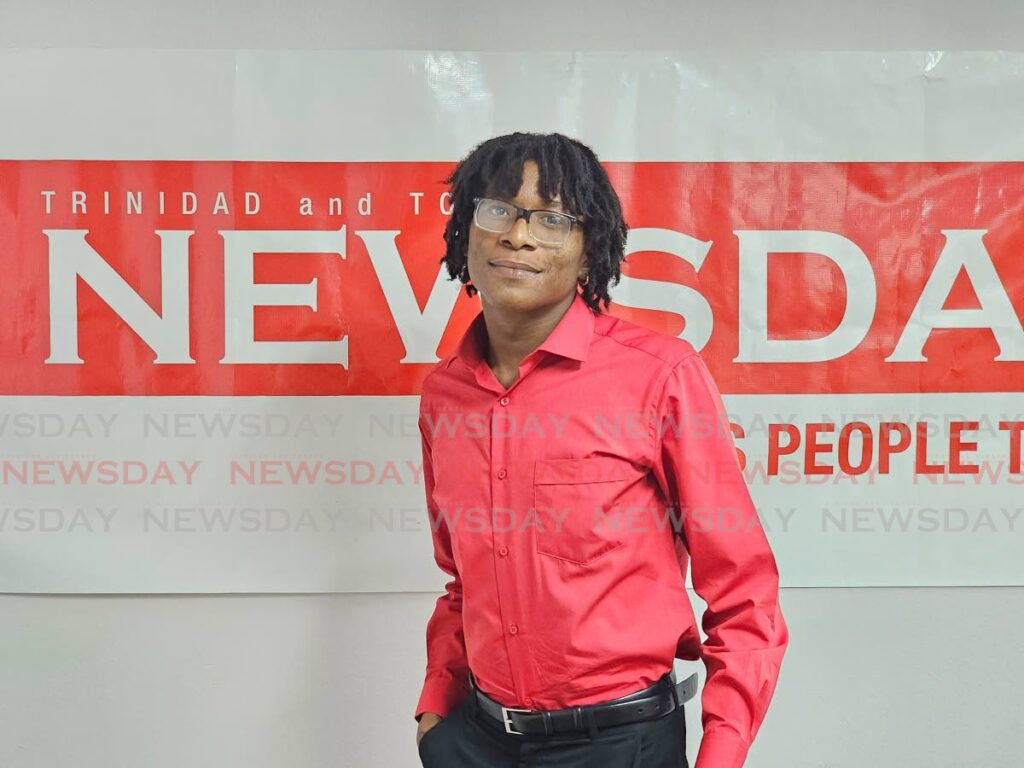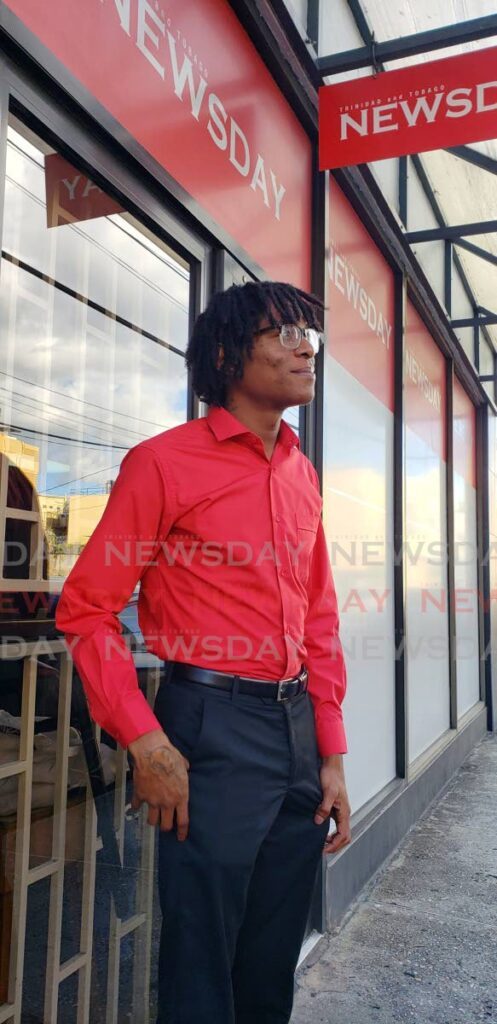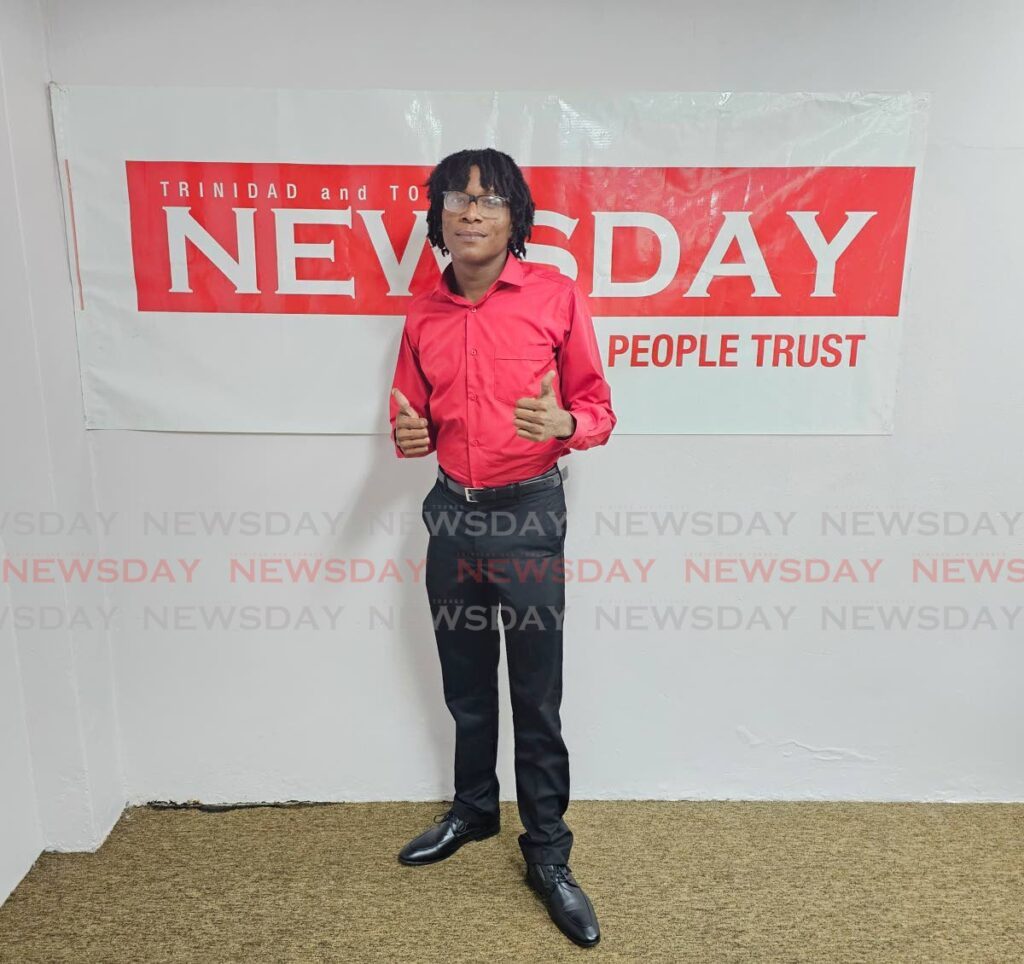HIV/Aids advocate: ‘I wanted to make a difference’

RONALDO "Selfmade Ronaldo" Castillo has made it his life’s mission to end discrimination against people living with HIV and Aids.
To do this, the 24-year-old uses social media to debunk common myths about HIV and Aids, to stop the spread of misinformation which Castillo believes is the root cause of the discrimination people living with HIV and Aids endure every day.
So far, the social media influencer has amassed an impressive, combined following of over 25,000 people across his TikTok, Facebook and Instagram platforms, where he is candid with his fanbase about his HIV-positive status, while creating content to reduce stigma.
“It (discrimination) follows you everywhere you go. You enter a new school, it follows you. You moving to a new area, it follows you. I believe most of the discrimination is because of a lack of understanding.”
In an interview with Sunday Newsday to commemorate World Aids Day, celebrated on December 1, Castillo explained his passion for HIV/Aids advocacy and the courage he had to foster to do so.
“I know for somebody living with HIV and Aids, it is not easy to do what I am doing. A lot of people would be like, how I got the courage to do this. But in reality, it took years of me building that courage.”
I wanted to make a difference
Most 11-year-old children in TT are busy preparing for their Secondary Entrance Assessment (SEA) examination – possibly anxious about their results and praying to pass for their first choice. Looking back at his life at that age, SEA stress isn’t a core memory for Castillo.
Instead, Castillo recalls coming to terms with his HIV-positive status and the sobering reality that he would be living with the virus for the rest of his life.
“I was young. I knew of my status, but I didn’t understand it clearly. So, I never used to study it at that moment.”
Castillo contracted the virus as a baby from his mother, who was unaware of her HIV status, since her partner, Castillo’s father, did not disclose his diagnosis to her.
At that time, Castillo explained, pregnant women were not required to undergo mandatory HIV testing at public healthcare facilities, compared with now where testing is compulsory to help end mother-to-baby transmission of the virus.
The mother-to-baby infection rate is now less than two per cent, according to the National Aids Co-ordinating Committee (NACC).
Taking the advice of her doctors, Castillo’s mother placed him in a children’s home with the mandate to care for children living with HIV.
It was only when he was required to leave the protective bubble of the home, did he truly understand the full scope of his diagnosis.
“In the home it didn’t have no hate. It had love…A maxi used to carry us to school. The whole school would be like, 'that’s the Aids bus,’ or ‘we come from the Aids home’ or ‘them is the Aids children.’ So, in the home it wasn’t a problem but from the time you step outside the home, it was a big problem.”
Castillo recalled an incident with his best friend, whom he lived with at the home, which opened his eyes to his reality. Castillo said his friend would often question why it was necessary to take his medication when people still discriminated against him, eventually leading him to stop his medication all together.
“This guy ended up getting Aids and nearly died…We had a talk months after…I got to understand that it was the discrimination. He wasn’t the only person going through that problem, it was a good few of them.”

Castillo said that experience sowed a seed in his mind, and he wanted to do his part to combat the negative stigma attached to HIV and Aids.
“Somebody had to make a change and if it took me to do that, I would be the one. And I decided to take that stand from ever since.”
Castillo left the orphanage at 13 and briefly lived with his mother. He eventually moved to a transition home where he said things started going downhill. Castillo left the transition home at 14 and began living on his own.
“I had to pay rent. I started off going to school but it wasn’t benefitting because I was getting eviction notices so I had to get a job. I was literally on my own – no guardian, no aunt, no mother, no father, just me."
Castillo admitted he got caught up with the wrong crowd, leading him to participate in activities he was not proud of.
“Nobody not perfect. I was young and I was caught up at a point in time in certain lifestyle…I started to smoke…I did little bad stuff.”
But throughout those dark times, Castillo said he never lost sight of his goals.
“I really wanted to be this person I am today. I wanted to make a difference…It’s not even for me but for the upcoming generation.”
It is not a death sentence
Castillo said he first started his social media influencer journey by creating a Facebook page to empower young people which he admitted, did not do very well. Following the advice of a friend, Castillo eventually launched his TikTok page, posting videos on a range of issues, including educational videos related to HIV and Aids. He remained consistent and after he gained 11,000 followers, Castillo decided it was time to publicly disclose his HIV-positive status. But even that decision was fraught with difficulty.
Castillo said he was held hostage in his relationship at that time, as his partner, who was aware of his HIV-positive status, threatened to expose him before he was prepared to do so.
“She knew it was part of my plan to come out. Actually, I was working on it the same year prior. She threatened me and I literally could not leave.”

Two weeks after his partner disclosed his status to people without his consent, Castillo ended the relationship.
“It kind of broke me down when it comes to communicating emotionally with women.”
Castillo said while it is important to disclose one’s status to a potential partner, he lamented how difficult it was to do so. He encouraged people to build their mental and emotional strength before disclosing their status.
In April of this year, when he was sure he was mentally and emotionally ready, Castillo went live on his TikTok platform where finally let his followers in on his very personal experience as a person living with HIV.
“The first day I came out, it was more than I expected, both good and bad. That day I literally felt like one minute I was over happy, the next minute like I wanted to faint…I was cold sweating. I couldn’t even watch my phone because of the comments…It was like a whole lot of mixed emotions.”
Castillo said though the overall response was predominantly positive, he had to switch off his phone as he feared the overwhelming sympathy he received from his followers threatened to reawaken his trauma.
“The comments, they started to give so much sympathy that it carried me back in a phase. I nearly lose myself again. It nearly break my spirit.”
Though it was a challenge, Castillo said he mustered the courage to keep posting and educating his fans about HIV/Aids.
“I had to deal with the comments from people who spreading wrong information, saying this wrong or that wrong and never did research. Like if I made a video talking about being undetectable, some people would flood the comments and say it is true while others say no, that is wrong.”
“Lack of understanding leads to stigma that leads to discrimination.”
To combat the spread of misinformation, Castillo said he implemented a content strategy where he posts videos explaining pertinent information as it relates to HIV and Aids such as what it means to be undetectable and how antiretroviral therapy works.
Castillo’s viral load (the number of HIV cells detected in a blood sample) is undetectable, which means he cannot transmit the virus to a sexual partner. While he is not cured, he teaches his online audience that once an HIV-positive person follows their antiretroviral therapy regimen as prescribed by their doctor, they can continue to live long, healthy lives.
“I know someone today who is 96 years old now and that woman strong and this is what I want people to know. It is not a death sentence. You could live a long and healthy life and if anyone tells you it is a death sentence, they lied.
Let communities lead
NACC technical director Ayanna Sebro told Newsday this year’s World Aids Day theme – Let Communities Lead – is important in the local context, as community agencies such as the Tobago Aids Society and Friends For Life, to name a few, have been supporting what she described as the “softer side” of the HIV response in Trinidad and Tobago.
“Without them, we would have not been able to achieve some of our current success.”
Sebro said the national response to end Aids by 2030 is linked firstly to ensuring access to everyone who is infected with HIV to life saving treatment and supporting retention in care.
“This means not just access to medication, but access to education, employment, stigma-free comprehensive health care, psychological and social interventions where necessary."
Aside from Castillo’s activism on social media, he is also a youth peer advocate for a workshop supported by the Ministry of Health that provides support for over 30 HIV-positive participants aged 15 to 25.
“It (workshop) provides a support system. It provides information pertaining to HIV/Aids, lifestyle, coping mechanisms…and most importantly, mental health."
As someone who lauds the importance of HIV/Aids community advocacy, Castillo said he was thrilled about this year’s World Aids Day community-centric theme.
“As we know, one hand does slap, two hands does clap. With a community, you have mental support, social support…a better support system…A community is always greater than one. I love that slogan, Let Communities Lead. Support system is a real serious thing when it comes to HIV and Aids."
Castillo said he hopes in the future, the virus would be perceived in the same way as the common cold.
“Instead of somebody hearing you have HIV and the impression is one of shock. The impression should instead be like, ‘Ok, and you know you could take tablets and live normal, right.’"
Castillo’s long term goal is to continue to create support systems for young people living with HIV and Aids and build on his advocacy work fighting the stigma attached to the virus.


Comments
"HIV/Aids advocate: ‘I wanted to make a difference’"